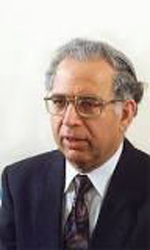
Other items in today’s column include:
*Political bytesz
*In Memoriam


SAN DIEGO — As the president of the Academy of the Hebrew Language since 1993, Prof. Moshe Bar-Asher has many friends and former students around the world. For example, he recently recalled in his courtly English, he once had the pleasure of teaching Mira Balberg, who is now a professor in UC San Diego’s Jewish Studies Department.
Himself a professor emeritus of Hebrew Language at the Hebrew University of Jerusalem, author of 18 books, and a recipient of the Israel Prize in the Study of Hebrew Language, Bar-Asher is, (if Hebraicists will forgive two Yiddish expressions), both a maven and a macher in the world of the Hebrew language. Now he and his colleagues are embarked on a project that he estimates will cost between $50 million and $60 million, building in Jerusalem a museum of the Hebrew language, which he says will impart to visitors two main stories.
“One will tell the story of between 31 and 32 centuries of written Hebrew, following every century by a word, or an expression, or by a text,” he said in a telephone interview from Jerusalem. “The second story will be about the revival of modern secular and spoken Hebrew starting in the 1880s with the arrival of Eliezer Ben-Yehuda.”
The museum will supplement the Academy’s ongoing activities of writing a historical dictionary of Hebrew, covering the language’s development from approximately the 12th Century BCE, and also serving as an Internet resource for people who want to know how a word from a foreign language can be translated into Hebrew. Questions may be asked of the Academy’s volunteer experts via Facebook, Twitter, and Instagram.
In a recent week, Bar-Asher said, the Academy handled 750,000 inquiries, from people whose interests ranged from orthography (spelling) to translations from English, Russian, or some other language. Additionally, he said, “We have committees that work, for example, on medical vocabulary.” Doctors at well-known hospitals in Jerusalem, Tel Aviv, Ramat Gan and Haifa “came to me and asked to create a new dictionary for medicine, so on the committee we have 11-12 doctors, all of them volunteers” Bar-Asher points out he also is a volunteer, putting in approximately 25 hours a week in service to the Hebrew language.
While the Academy of the Hebrew Language recommends new Hebrew words, ultimately it is the news media that becomes the final arbiter of whether the words will be used by the general population, Bar-Asher said. If broadcast and print journalists use the words in their stories, the words become popularized. If journalists don’t pick up the words, they could soon become forgotten.
I asked if there were a new Hebrew word for the coronavirus, which led to an interesting discussion. He said that “coronavirus” has become an international word, recognized in many languages. He was opposed to Hebraicizing the word, on the grounds that “we hope it is a temporary word.” On the other hand, he said, “we do accept many words from other languages” and such was the case even back to Biblical times. “The Bible has loan words from Egyptian, Arcadian, and Aramaic,” he said. “The Talmud has over 2,000 words from Greek and Latin.” So, Bar-Asher commented, it would be “foolish to say that every word must be translated” On the other hand, “Language is not only a story for linguists; it is a culture. If Hebrew will be neglected by using many, many English words, it will disconnect people from the continuation of our culture. So we have to find an exact equilibrium between two ideas — to guard our culture, but not to forget that we live in an international world.”
More information about the Academy of the Hebrew Language, including ways to donate, may be found via this website.
*
Political bytes
*Congressswoman Susan Davis (D-San Diego) successfully inserted into the House-approved version of the National Defense Authorization Act a provision to provide food assistance to the families of service members in the lower enlisted ranks. ”
“We should be able to meet the basic needs of our military families,” said Davis. “Military families go where they are ordered and sometimes that means moving to areas with a higher cost of living. Add to these situations where a spouse might have trouble finding new employment and this becomes a recipe for food insecurity. Creating a basic needs allowance is a simple solution to the critical issue of food insecurity among some military families.”
She noted in a news release that the measure also includes a provision “to begin the process of changing the names of military bases and infrastructures named after individuals who served in the Confederacy.”
Other provisions in the bill highlighted in her news release included:
“Support for Women in the Afghanistan Security Forces – Davis included a provision to set a goal of using $29.1 million to support the efforts of the Government of Afghanistan to promote the recruitment, training, integration, and retention of Afghan women into the Afghan National Defense and Security Forces. This represents a key step to assure that peace and security processes do not overlook the inclusion of women, a critical strategy that research has shown reduces conflict. Davis has made numerous trips to Afghanistan in support of the troops, also meeting with Afghan women serving in their country’s defense forces and with women political and community leaders. A key to the success of the mission in Afghanistan is the ability of women to contribute to its growth and security.
“Grieving the Loss of a Child – This Davis Amendment changes current leave policy for service members so their pre-approved parental leave is not terminated in the tragic event of a child’s death. This will ensure all military members have time to grieve after losing a child.
“Absentee Ballots – The Committee approved an amendment offered by Davis to allow military and overseas voters to track and confirm the receipt of their ballots. Those fighting to defend our freedoms and democracy deserve to know their votes have been counted.
“Dangerous Dogs – Establishes a standardized policy applicable across all military communities for the regulation of certain breeds of dogs. Some servicemembers, who are regularly transferred to different duty stations, are prevented from taking their dogs with them because of bans on breeds of dogs deemed to be dangerous in different areas.
“Protecting Servicemembers from Forced Arbitration – Bans forced arbitration in employment rights claims, giving servicemembers full legal remedies if their employer fires them based on their military service.
“Strengthening Oversight of Policies to Prevent Sexual Assault – This provision will require the Department of Defense to brief defense committees on the effectiveness of the 2019 military justice overhaul and provide recommendations for further improvement of the military justice system. Judges, Advocates, and General of each Armed Service must brief congressional defense committees on the services’ progress in establishing the Special Victims Counsel Programs, as well as the new separation polices for the victims and accused.”
*Terra Lawson-Remer, opposing incumbent Kristin Gaspar in the 3rd District of the San Diego County Board of Supervisors, has been endorsed by the Sierra Club and the League of Conservation Voters.
*

In memoriam
*Dawn Eileen (Cherlyn) Davis, 78, died Sunday, July 19, Am Israel Mortuary announced. The daughter of Frederick Cherlyn and the former Ruth Denmark, she is the author of the novel Winston’s Amazing World, and also worked in the fields of interior design, public relations and legal recruiting. Rabbi Yossi Teifenbrun of Chabad of Pacific Beach officiated at noon services on Sunday, July 21, at the Home of Peace Cemetery, 3668 Imperial Avenue. Davis is survived by her sons Scott Davis and Darren Davis, and grandchildren Emma Davis and Brett Davis.
*
Donald H. Harrison is editor of San Diego Jewish World. He may be contacted via donald.harrison@sdjewishworld.com Free obituaries in memory of members of the San Diego County Jewish community are sponsored on San Diego Jewish World by Inland Industries Group LP in memory of long-time San Diego Jewish community leader Marie (Mrs. Gabriel) Berg.
I was fortunate in having Professor Bar Asher as a teacher when I was in college. He is not only a brilliant scholar, he is also one of the finest menschs I’ve had the occasion to meet. I am sure that any project of his will turn to gold.
Pingback: Vermont Campaign Finance, Black Lives Matter Protests, Indie Game Festival, More: Wednesday Afternoon ResearchBuzz, July 29, 2020 - Southwest Virginia Genealogy .comSouthwest Virginia Genealogy .com